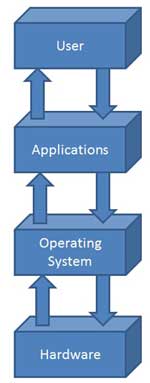What is Operating System | What is meaning of Operating System | What are the main purpose of an Operating System
A working framework (OS) is framework programming that oversees PC equipment and programming assets and gives regular administrations to PC programs.
Time-sharing working frameworks calendar errands for productive utilization of the framework and may likewise incorporate bookkeeping programming for cost designation of processor time, mass stockpiling, printing, and different assets.For equipment capacities, for example, info and yield and memory distribution, the working framework goes about as a delegate among projects and the PC equipment, in spite of the fact that the application code is typically executed legitimately by the equipment and habitually makes framework calls to an OS work or is hindered by it. Working frameworks are found on numerous gadgets that contain a PC – from mobile phones and computer game consoles to web servers and supercomputers.
The Operating System is a program with the accompanying highlights −
A working framework is a program that goes about as an interface between the product and the PC equipment.
It is an incorporated arrangement of particular projects used to oversee in general assets and tasks of the PC.
It is a particular programming that controls and screens the execution of every single other program that live in the PC, including application programs and other framework programming.

Attributes of Operating System
Information gadgets, for example, a console and mouse
Yield gadgets, for example, show screens, printers and scanners
System gadgets, for example, modems, switches and system associations
Capacity gadgets, for example, inner and outside drives
The destinations of the working framework are −
To make the PC framework helpful to use in an effective way.
To shroud the subtleties of the equipment assets from the clients.
To give clients an advantageous interface to utilize the PC framework.
To go about as a mediator between the equipment and its clients, making it simpler for the clients to access and utilize different assets.
To deal with the assets of a PC framework.
To monitor who is utilizing which asset, conceding asset demands, and intervening clashing solicitations from various projects and clients.
To give proficient and reasonable sharing of assets among clients and projects.
Here is a rundown of probably the most unmistakable trademark highlights of Operating Systems −
Memory Management − Keeps track of the essential memory, for example what some portion of it is being used by whom, what part isn't being used, and so forth and designates the memory when a procedure or program demands it.
Processor Management − Allocates the processor (CPU) to a procedure and arrangement finds the processor when it is never again required.
Gadget Management − Keeps track of the considerable number of gadgets. This is likewise called I/O controller that chooses which procedure gets the gadget, when, and for how much time.
Document Management − Allocates and DE-designates the assets and chooses who gets the assets.
Security − Prevents unapproved access to projects and information by methods for passwords and other comparable procedures.
Occupation Accounting − Keeps track of time and assets utilized by different employments or potentially clients.
Power Over System Performance − Records delays between the solicitation for an administration and from the framework.
Association with the Operators − Interaction may occur by means of the comfort of the PC as guidelines. The Operating System recognizes the equivalent, does the comparing activity, and educates the task by a showcase screen.
Blunder distinguishing Aids − Production of dumps, follows, mistake messages, and other troubleshooting and blunder identifying strategies.
Coordination Between Other Software and Users − Coordination and task of compilers, translators, constructing agents, and other programming to the different clients of the PC frameworks.
A working framework (OS), in its most broad sense, is programming that enables a client to run different applications on a registering gadget. While it is feasible for a product application to interface legitimately with equipment, most by far of utilizations are composed for an OS, which enables them to exploit normal libraries and not stress over explicit equipment subtleties.
The working framework deals with a PC's equipment assets, including:
The OS likewise gives administrations to encourage the effective execution and the board of, and memory allotments for, any extra introduced programming application programs.










Post a Comment